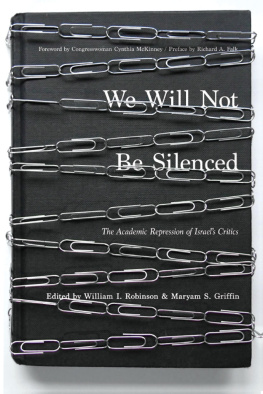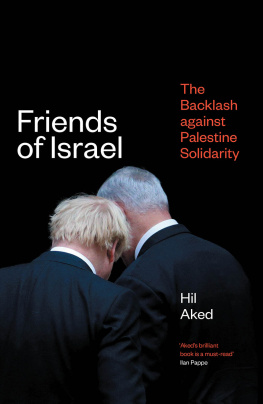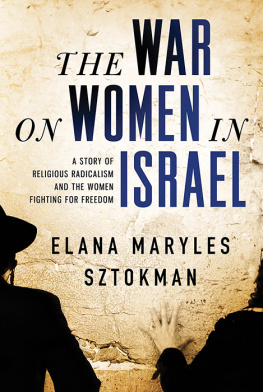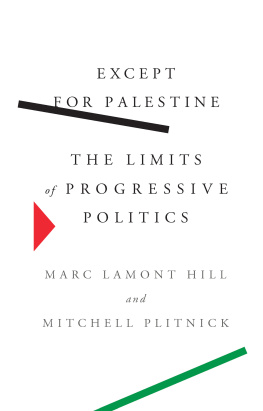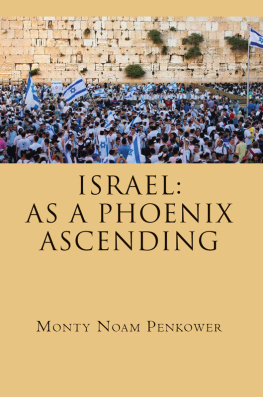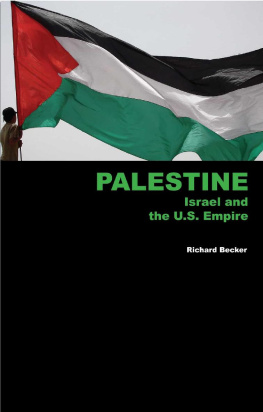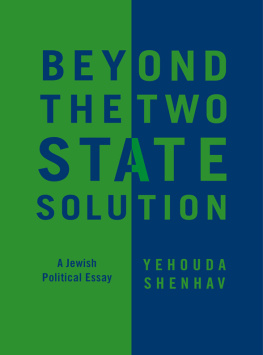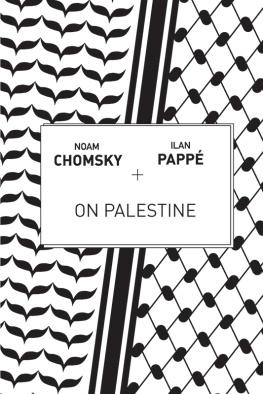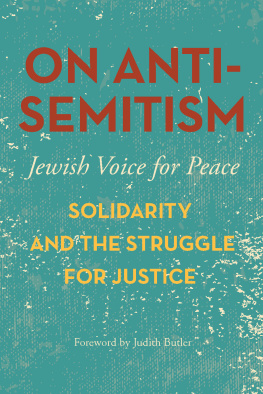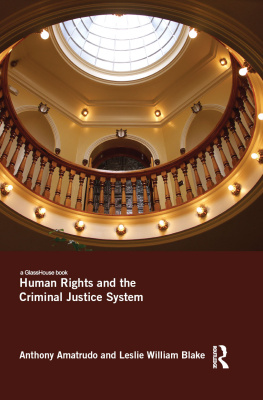We Will Not Be Silenced
We Will Not
Be Silenced
The Academic Repression
of Israels Critics
Edited by
William I. Robinson and Maryam S. Griffin

This edition 2017 AK Press (Chico, Oakland, Edinburgh, Baltimore)
ISBN: 978-1-84935-276-5
E-ISBN: 978-1-84935-277-2
Library of Congress Control Number: 2016948842
AK Press
370 Ryan Ave. #100
Chico, CA 95973
USA
www.akpress.org
www.akuk.com
The above address would be delighted to provide you with the latest AK Press distribution catalog, which features books, pamphlets, zines, and stylish apparel published and/or distributed by AK Press. Alternatively, visit our websites for the complete catalog, latest news, and secure ordering.
Copyright William I. Robinson and Maryam S. Griffin 2017
This book is printed on paper suitable for recycling and made from fully managed and sustained forest sources. Logging, pulping and manufacturing processes are expected to conform to the environmental standards of the country of origin.
Typeset by Stanford DTP Services, Northampton, England
Printed in the USA.
Contents
Foreword
Cynthia McKinney
Former Member of the United States Congress
I remember it as if it were yesterday, although it really happened almost 15 years ago.
Not many people wanted to touch me after, from my position as Member of Congress from the State of Georgia, and member of the House Committees on International Relations and Armed Services, I demanded an investigation of the tragic events of September 11, 2001. After all, the people of the US had invested trillions of dollars into a military and intelligence infrastructure that failed four times on one day and I felt that my constituents deserved an explanation of what went wrong and if, as was promised to them, we were going to work together as a country to prevent a reoccurrence, we had to have an independent investigation and explanation of what exactly had happened on that day. After learning that both President George W. Bush and Vice President Dick Cheney had contacted Congressional leaders asking that they not support any investigation of the tragic events of that day, I became outraged and wrote an Op Ed that was carried in several newspapers. In that Op Ed, I mentioned that the National Transportation Safety Board routinely investigated train derailments and airplane crashes. So, why not an investigation of the events of September 11? I went on a Bay Area California radio program and repeated my call for an independent investigation.
And then, several weeks later, out of the blue, I was the main topic of national conversation, with the hasbara unleashed against me. (Hasbara roughly translates to propaganda in Hebrew. It can loosely be thought of as a virulent, organized public relations smear campaign unleashed by devotees of Israel, in some cases, even paid for by the state of Israel, carried out by what Professors Robinson and Griffin, in their Introduction to this book, refer to as the Israel Lobby.) It was like a switch was flipped by somebody, and all of a sudden, the light was shone on me, exposing a brilliantly painted neon-glow bulls-eye on my back. I became the focus of ridicule, stigma, and ultimately silencing, by the likes of CNN, Washington Post, New York Times, local Georgia news outlets, and even some alternative progressive news and opinion outlets on the internet for which I had earlier served as one of their go-to persons. Inexplicably, after raising the investigation issue, I was soon accused of being a conspiracy theorist, anti-Semitic, and a holocaust denier.
After losing my Congressional seat in the hasbara-induced election-time whirlwind, I was invited by the Africana Studies Department at Cornell University to serve as a Rhodes Fellow, which meant that I got to spend one week on the Cornell campus, interacting with the students, lecturing about my Congressional experiences. Before I even reached the school, the campus newspaper began playing the anti-Semitism card against me. By the time I reached the campus, quite an effective frenzy had been created. Certain students followed me everywhere I went on campus taunting me as if I were a caged animal and the students were cruel animal tamers, accustomed to using the lash to whip their prey into submission. This same group of students also each had a notebook from which they read as they attempted to shut down every classroom appearance that I made. These students were loud, boisterous, unruly, and completely in charge inside and outside the classrooms as the authorities that had invited me onto the campus were in utter cowardice mode, remaining silent as I was forced to awake each day to face yet another blistering test of my dignity.
These playbook students were the first to raise their hands to ask the same questions; the first to bum-rush the microphones, leaving the other students with non-hasbara questions, flat-footed, slow, seemingly inept, and unable to ask their questions. These hasbara students even orchestrated disrupting my institution-wide public lecture by being dragged by campus security out of the auditorium where that capstone lecture took place. I was told that the students even arranged a meeting with members of the Board of Trustees to complain about my presence on campus. Finally, the Rhodes Fellowship was defunded and I was the last Rhodes Fellow on the Cornell University campus. The irony of my Cornell experience is that I was invited by the Africana Studies Department and my intention was to speak about the situation in Haiti; Israel was nowhere on my agenda. But, because of the actions of the hasbara students, the issue of Israel (and Palestine) occupied a place that was front and center.
My experience on the Cornell University campus is not unlike that of the professors and students in this book who chronicle their experiences when Constitutional rights, academic freedom, and scholarly curiosity are not allowed to exist. The pro-Israel totalitarian groupthink enforced by the hasbaras internet, radio, TV, and print media warfare has completely rewritten the rules of academic engagement destroying professional and institutional independence in the process. US universities are as much under attack as is any battlefield in the US/Israel/NATO-led war of terror. Indeed, terror has now entered US university classrooms.
My all-time favorite speech is that of President John F. Kennedy who chose the occasion of the 1963 graduation ceremony of American University to make a profound policy statement. In a speech entitled, A Strategy of Peace, lasting fewer than 30 minutes, President Kennedy uttered the word peace over 30 times. Here is what he had to say about the importance of the university as a place of research, bold thinking, and important policy debate:
There are few earthly things more beautiful than a university, wrote John Masefield in his tribute to English universities and his words are equally true today. He did not refer to towers or to campuses. He admired the splendid beauty of a university, because it was he said, a place where those who hate ignorance may strive to know, where those who perceive truth may strive to make others see. I have, therefore, chosen this time and place to discuss a topic on which ignorance too often abounds and the truth too rarely perceived and that is the most important topic on earth: peace.
President Kennedy chose the location of a US university to challenge the very military-industrial complex about which his predecessor, President Eisenhower, had issued a warning. A few months later, President Kennedys brains were blown out in full public view, thus ending any Administration-led efforts to make peace with the Soviet Union, the major US geopolitical rival at that time. The ground has shifted underneath US campuses that are losing their competitive edge in free thinking. Professors Robinson and Griffin, and all of the contributors to this anthology, are trying to stop the fracking that is causing this by exposing the illegal drilling being done to undermine the foundation of academic freedom and integrity. US universities are one of the new battlefields putting academic freedom and institutional integrity at risk.

